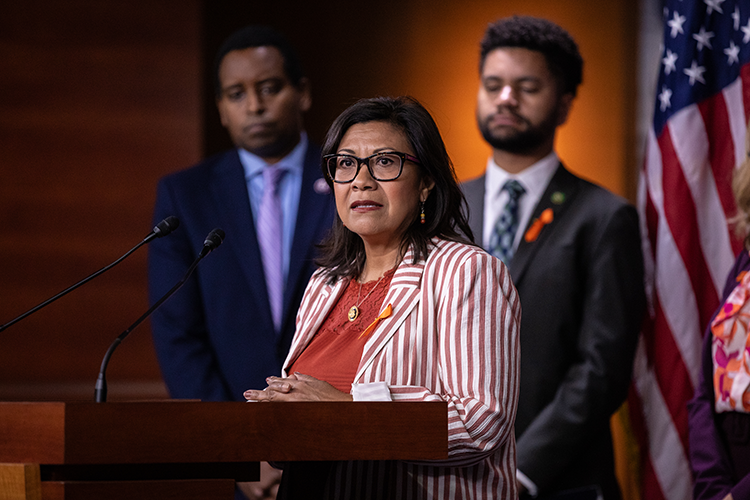Federal judiciary must 'establish robust systems' to handle workplace abuse, study finds

“The federal judiciary must urgently establish robust systems to handle sexual harassment claims, because clearly its longstanding reliance on the good character and conduct of individuals alone has been grossly insufficient,” Rep. Norma Torres said. (Photo by Anna Rose Layden/Getty Images)
Updated: Federal courts have failed to consistently address workplace misconduct or adequately collect and analyze data about these cases, according to a new study conducted by the Federal Judicial Center and National Academy of Public Administration.
U.S. Rep. Norma Torres, a California Democrat who has pushed for greater protections for judicial employees, commissioned the study last year to evaluate the judiciary’s systems for preventing and managing workplace sexual assault, harassment and misconduct. The resulting nearly 200-page report includes about three dozen recommendations to address what Torres calls “startling findings.”
“It is disheartening to hear about incidents of sexual assault and harassment involving judicial employees who lack trustworthy and safe avenues to report and navigate these horrifying and traumatic encounters,” Torres said when releasing the report on Wednesday. “The federal judiciary must urgently establish robust systems to handle sexual harassment claims, because clearly its longstanding reliance on the good character and conduct of individuals alone has been grossly insufficient.”
NPR, Reuters, Bloomberg Law and Courthouse News Service have coverage.
Investigators for the study interviewed a variety of judiciary employees, including judges and circuit directors of workplace relations, and focused on assessing how courts have implemented employment dispute resolution plans; how resolution processes are working; the nature of educational and outreach efforts; and whether public-facing judiciary websites provide workplace conduct information.
Some of the report’s primary findings:
• No entity in the judiciary is tasked with oversight of systems to prevent or resolve misconduct.
• Because law clerks remain hesitant to raise concerns about abuse in the workplace, the judiciary should address underlying structural issues that lead to power imbalances between judges and clerks.
• There is no national requirement for judiciary employees to attend training on workplace issues.
In his 2017 year-end report, U.S. Supreme Court Chief Justice John Roberts Jr. called for the federal judiciary to establish a safe workplace for its employees. In 2019 and 2021, the judiciary adopted two model employment dispute resolution plans at the recommendation of the Federal Judiciary Workplace Conduct Working Group, which was established at the direction of Roberts. It was tasked with examining the judiciary’s workplace conduct practices and policies and considering whether they helped create “an exemplary workplace.”
According to the Federal Judicial Center and National Academy of Public Administration’s report, all courts have adopted some form of the model employment dispute resolution plans, which provide three avenues for resolving related matters. These include confidential advice and guidance, discussion and mediation between the parties involved, and a formal complaint process and assessment by a judicial officer.
The report notes that while there is room for improvement, these and related reforms have helped improve court culture.
A spokesperson for the Administrative Office of the U.S. Courts released a statement on Wednesday saying the Judiciary Workplace Conduct Working Group is “actively assessing additional recommendations to build on the significant changes that were implemented in the past few years.”
“We appreciate the thoughtful and thorough work of NAPA and the FJC and are gratified that the researchers identified recent changes that have had a positive impact for Judiciary employees,” according to its statement.
Among its recommendations, the new report suggests making financial damages available to encourage more employees to voice concerns about workplace misconduct. It also says the judiciary should consider publishing information about decisions in employee dispute cases to build confidence within its own workforce and with the public.
“Oversight and transparency are hugely important in strengthening workplace safety and this report gives the Judiciary a roadmap to put both into practice,” National Academy of Public Administration President and CEO Terry Gerton said in a statement on Wednesday.
Updated at 11:25 a.m. Friday to include comments and additional context from the Administrative Office of the U.S. Courts.
Write a letter to the editor, share a story tip or update, or report an error.


